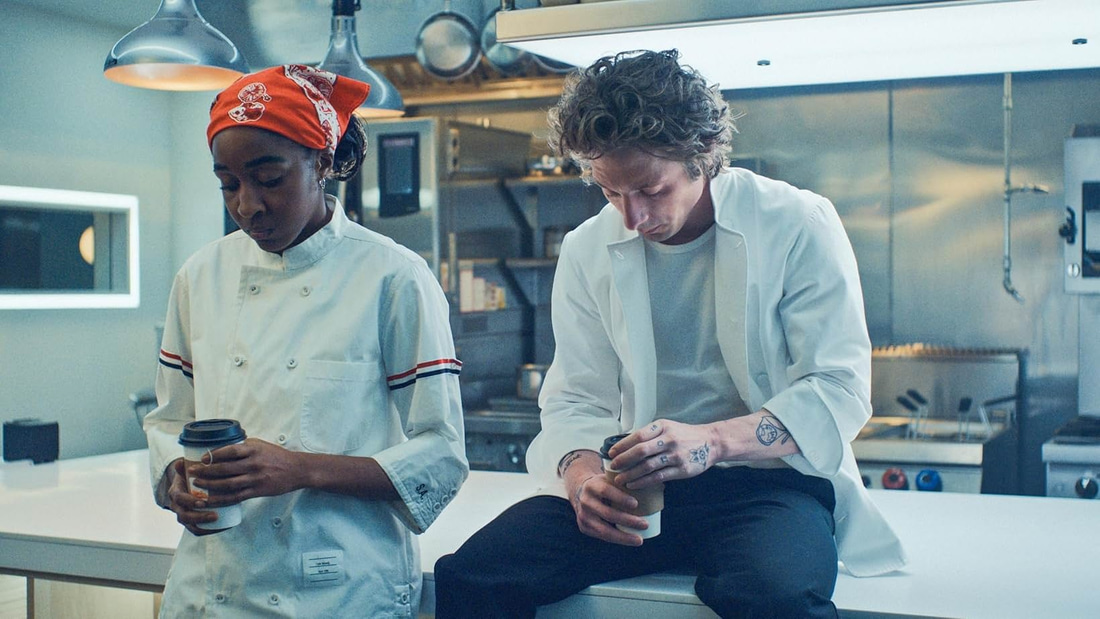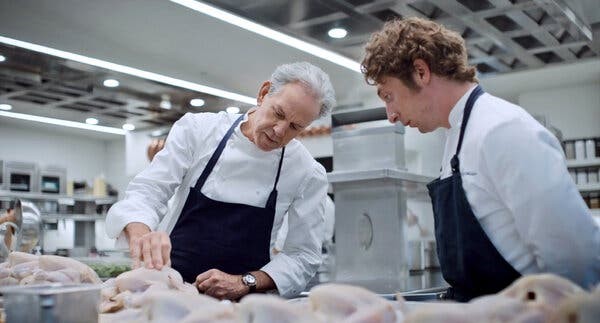The Bear - Three Components to Serve a Dish

Fine dining is one of the few professions that still holds a myth to it. The aesthetic of the clean kitchen, clean aprons, and uniforms without a single wrinkle mirrors the discipline of the chefs who wear them. Working hours that seem unimaginable yet culminate in creativity and an almost tender beauty in the presentation of dishes, revealing a love for the product that speaks from the plate.
Ultimately, it's about creating not just the perfect diner experience, but ensuring every dish stands on its own. In a perfectly coordinated kitchen, nothing happens by accident; each plate is perfectly planned, like the composition of an orchestra, and not a single note can be missed. Everything that is placed in a dish serves a purpose, adds another depth, another mouth feel, another layer in the overall composition of the plate. To achieve the perfect orchestra, each instrument must be synchronized perfectly. A dish that is born out of creativity, which is seldom born out of complete order, must then be orchestrated perfectly into reality that demands precision and discipline. Ultimately, a kitchen is a place in which the heights of tension and discipline come together to create a fleeting moment of beauty, making the fine dining industry a place of duality: creativity and beauty that is produced from a synchronized and highly disciplined team.
The reward? For many, in the best case, a Michelin star, an honor that only a few chefs get to receive. But it is an honor that comes with conditions, as the star has to be defended every year, measuring whether the creativity is still worth it.
It is no wonder that this special orchestra has attracted more and more attention in recent years, through Hollywood, such as Burnt with Bradley Cooper, or The Menu, starring Ralph Fiennes. These Blockbusters have already tried to explore the tensions of the fine audience and transport it to a broader audience. Still, the driving force of the last years has undoubtedly been The Bear, created by Christopher Storer and currently running in its fourth season on Hulu and Disney+. The show became an immediate success and one of the best shows of recent years, agreed upon by critics and audience, follows young fine dining chef Carmen Berzatto, who returns to Chicago to save the family's Sandwich store after his brother has died. There, he is confronted with the somewhat chaotic employees, who remain skeptical about his approach to cooking. With the progression of the show, family trauma and personal troubles mark the characters, while the family restaurant slowly but steadily becomes a fine dining restaurant. The main focus of the most recent season is to save the restaurant financially within 1440 hours, exactly two months, to save the restaurant from being shut down. To save money, eventually, the components of each dish are reduced to three. Three components are necessary to tell a whole story and convince the audience, something that the showrunners have also taken seriously, it seems. Eventually, The Bear works like a dish. Every component is carefully chosen, with depth and complexity on its own, to add another layer, perfect and delicious on its own. Still, eventually, the whole composition on the plate creates an entire picture, carefully orchestrated, and served to the audience.
Season Four functions as the main course in the menu of The Bear. In menu planning, everything is carefully planned and worked out to this point, where a product is often highlighted, typically the most expensive one. Experiments are usually set aside, and the chef's true strengths are highlighted, with classic components that have proven to work.
This is also why season four is the main course of The Bear: it brings out a recipe of the past seasons that has proven itself and highlights its strengths again, in which three components stand out.
The Rock-Solid Ground: The Fine Dining Industry
One aspect in which The Bear has consistently proven itself is in its depiction of the fine dining industry with genuine authenticity. The show is exceptional in its authentic depiction of the creation of food, the atmosphere in the kitchen, and the skills of the actors regarding cooking. For sure what stands out the most is that the show has created a new archetype of a chef in the media – the talented, ambitious, and creative broken male character, combined with an incredible amount of recognition value: the messed-up hair, the white shirt, and the blue apron that immediately mark the character as being a part of The Bear. Those are, of course, factors that add to the depth of the show and are a crucial element to create recognition in modern media. However, one of the show's fundamental components is its authenticity in portraying the profession of being a chef.

Notably, Jeremy Allen White's training as Carmy is particularly impressive, as he can hold a knife and arrange a plate with remarkable authenticity. A chef even commented that when Carmy is in the kitchen, "it feels right." White did more than his homework.
Next to the authenticity of the techniques, it stands out how much space the love for food and cooking is given to explore the motivation of the characters. One of the most remarkable episodes is purely about the love of food and how dishes are created, transmitting the passion that the characters feel for their profession.
To communicate this love through the screen to an audience that is most likely not in the industry, makes The Bear one of the most thrilling pieces of art, because it takes the profession seriously, seriously in its attempt to portray a profession and not push the profession into the standards of Hollywood.
This is key to the show: being a chef is not the main character's profession; rather, it is about being a chef and how integral it is to the personalities of the main characters.
This might be one of the core reasons why so many of the most legendary chefs, such as Thomas Keller from The French Laundry, René Redzepi from Noma, and Grant Achatz, who holds three Michelin stars in Chicago, are renowned. Will Guidara, co-founder of Madison Eleven Park, agreed to participate in the show because it takes the profession and the dedication it demands seriously.
Exactly this attention to detail is continued in the fourth season of The Bear, in which the process of cooking is again shown in many scenes and close-ups. One of the most striking scenes when the season is seen from the perspective of attention to authenticity is in Episode 7 of Season four. A character recounts his life with Carmy in New York, noting that he rarely saw him, but whenever they met, he vividly remembered Carmy's distinct yet elusive scent. Sydney and Carmy look at each other and call it the "restaurant smell" – it is the first time that I have heard someone mention this very particular smell outside of this specific bubble, to which I can confirm, yes this smells exists and it is every particular; almost impossible to describe and even hardly identify if you haven't smelled it before. It may seem like something minor, which it is, but this is what makes the show so special; the research is rock solid, embedding all the other components of the show on a perfectly executed foundation.
The Highlight of the Dish: Carmy
In season four, The Bear returns to the character that starts it all: Carmy is once again the most present character of the season. He has been before, but especially in seasons one and two, the shows took many necessary episodes to focus solely on other characters, establishing their motivations more effectively. However, like season one, season four takes a turn and gives Carmy's character more space. And it is essential to do so, since in this season, a more profound change in him becomes apparent. True fans of the show will likely know that it doesn't follow the typical Hollywood narratives, and not every episode or season necessarily comes with character development. For example, season three focused heavily on establishing the restaurant, leaving most characters' development relatively untouched. This is a narration technique that one needs to get used to, but it shows that growth is not always linear. Nevertheless, this makes season four even more critical for Carmy, as some profound changes in him become increasingly visible.
The showrunner presented Carmy as driven by anxiety, sadness, and an obsession with being perfect as a chef who almost drowns in his ambitions and is willing to sacrifice everything for it. What profoundly changes in the transition to seasons three and four is that Carmy becomes increasingly quieter. In the first three seasons, he was often quick with a bad word, lost his temper easily, and engaged in harsh and unnecessary fights. In season four it becomes clear how usually he becomes absent with his mind, while his inside is visibly raging – the pressure of a decision he will have to endure weighs heavy on him, as the truth also becomes clear to the audience that the character that we have seen for the last seasons cannot continue the way he did. Exactly this taste of change that lies in the air makes him so delicate for his season: in his character, the tone of the whole season is manifested. Although the restaurant is running out of time, this marks the first season where a sense of acceptance begins to glimmer, accompanied by hope, which serves as the ambassador of a healing journey.
The tone for this develops is already set in Episode 10 of season three, in which he confronts one of his former chefs, Fields, about the humiliation and the psychological torture he has endured at his hands while he worked for him. However, Fields insists that his talent grew into the chef he is today, and that the trauma he endured is less significant in comparison. After this confrontation, the realization begins to settle that he has to break the cycle and start actively not to pass the trauma he has endured in his profession down to Sydney, increasingly beginning to compliment her more and picking less fights with her and, therefore, starts to become more what she wishes him to be: a mentor that finally lets her have her dish on the menu without making any changes and ending his obsession with changing the menu every evening, which was an expression of his search to find something that he can settle with.

Eventually, he is also able to take the first steps also to face the family trauma that has been lingering since the first season, which was primarily driven by the death of his brother and the behavior of his mother, who he finally becomes able to face on his own after several years, marking a turning point that he might be able also to face the past of his family.
The most crucial scene of the season was undoubtedly a telephone call between Carmy and his sister Sugar, who confesses that she always admired that he has found something that he loves and is good at. However, it would be alright if he no longer feels the same love, because his ability to love something in the first place will allow him to love again, giving him the permission to leave the restaurant and allow himself to heal outside of the kitchen. His development into the realization that his dream of being a chef has eaten him alive is a beautiful statement by the showrunners that passion is not always the key to becoming happy; it can also burn you out and let you forget what you are outside of what you "love" so deeply. The Carmy of season four allows for two truths at the same time: that you can feel hate for the things that you love.
The talent he has consistently demonstrated on the show, which cannot be doubted, did not contribute to the restaurant's success or help him overcome trauma. For a talent to further thrive, the outside and inside are of crucial importance, and Carmy is deeply limited by his lack of confidence and passion – he only continues because he has sacrificed much of his life for it, and with it, his peace.
Even though this might sound like a rather hopeless message, it marks the beginning of realizing that to let Carmy heal, his place has to be somewhere else. And like a good menu, everything in the show and his development seemed to have worked towards the moment in which he decides to leave The Bear. It is undeniably not the hopeful ending one has hoped for, but it is the only logical consequence in his character development. Carmy has accomplished everything possible in his profession and has no room to grow further with the restaurant professionally; everyone else still has room to grow because the restaurant helps them to grow. Carmy cannot grow professionally anymore; he can only heal.
The Next Step is the Desert
Overall, Carmy has become more collected this season. Throughout season three, the characters have also endured a journey that allows them to work together seamlessly every evening, acknowledge their responsibilities, and communicate more openly. It would be easy to draw the line now and tell the perfect ending of a successful restaurant that is showered in compliments. Even when the characters have mostly overcome their differences in the workplace and the machinery in the restaurants works, the road to identity, their own identity as a restaurant that promises perfection, is a valid point that can break the team. Throughout the season, the personal troubles of the side characters are pushed to the back, and their problems become more professional. In the process of building the restaurant, the steps the characters took seemed huge, and now that the routines settle, the actual game of patience sets in because the closer the goal, the smaller the steps become, the more details must be managed. The more it becomes clear that, in the end, the details are what make the restaurants what they hope they might become.
The personal trouble Richie still faces is more or less resolved with Episode seven, in which he can embrace the patchwork family he has with his ex-wife, and he is stable in his feeling of responsibility in The Bear and his motivation to take one step further. The same accounts for Tina, who was set back even more this season and was mostly presented in her struggle to increase her speed in preparing the pasta.
By far the most consisted character of the season in the kitchen has been Marcus, who has settled his troubles and grows creatively and consistently, while being passionate – a combination that is necessary to stand out, which is more than proven when a magazine chooses Marcus at the end of the season as one of the rising chefs of Chicago.

As the machinery develops its routines, Sydney will be the anchor of season five, which has already been confirmed. Throughout the season, Sydney was torn in her decision whether to stay in The Bear or open a new restaurant with another chef and start all over again. After deciding to remain with Carmy and his team, Carmy reveals his decision to leave to her, setting up a season five where Sydney will likely be introduced in her quest to become the head chef, struggling to find her role in the process.
Most good menus offer five courses, five dishes that are individual but tell a story that must come to an end eventually. The show has masterfully managed to tell a convincing story for four seasons, showcasing realistic growth. It would be a great chance to offer, with season five, a dessert that brings the menu to a satisfying end, no hunger left, and richer with great memories.
WRITTEN BY

Annabelle
As long as I can remember, I have been absolutely obsessed with literature and cinema - for me, both have been a way to not only explore different lives and experiences, but what moves contemporary society. Therefore, I love to explore how literature and cinema connects to societal developments and the green light it can offer to understand ourselves and our surrounding.



